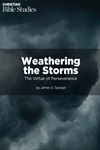
Weathering the Storms
William Faulkner wrote, "a man is the sum of his misfortunes."1
Faulkner's observation states a profound truth. We are the product of our sufferings. Our pains forge our souls. The grief we've borne drapes our mental landscapes, and our moral characters are the direct result of how we've responded to suffering. The moral skill that is both a requirement and a result of suffering is perseverance. As one manages to "keep the faith" through suffering, one grows even stronger to deal with whatever further suffering one may experience.
To internalize this from a Christian perspective is a great challenge. Our thinking about suffering is steadily infiltrated by cultural influences, so we must resist the temptation to conform to worldly patterns of thought as we reflect on the subject. Indeed, to present a biblical view on suffering is to highlight just how countercultural it is.
Three Sorrows
I don't pretend to be an expert sufferer. Yet I'm no stranger to suffering. My first major sorrow came in my youth when my family moved from Detroit to Jackson, Mississippi, wrenching me away from my siblings, my friends, and all that was familiar to me. To disorient me even further, puberty struck at the same time, and the hormonal confusion compounded the pain. I fell into a clinical depression that lasted several months. It is said that the grief of the young is especially deep because youth lack the experience to know that time heals. "This too shall pass," my mother told me repeatedly during that first cruel summer in Mississippi. She was right, but I couldn't comprehend her meaning. And to this day that sorrow remains the worst I've ever known, if only because I was so helpless to deal with it.
Nearly a decade ago as a new instructor at Taylor University, I experienced a major trial that took the form of betrayal. My first wife was unfaithful to me and had no interest in repenting or reconciling. The emotions I experienced were wide ranging, but all of them were excruciating, from rage to shame and everything in between. Even with the perspective of adulthood, I found it difficult to imagine full recovery when in the throes of my divorce. But the friends and colleagues God provided me were ever-present helps in that valley, and with the passage of time, healing did come. Today, my new wife, Amy, and our three children are constant reminders of just how wondrously excessive the grace of God can be.
My third major life trial to date came with the passing of my father in the summer of 2001. His death was actually only the bitter culmination of a decade long sorrow. For years my dad battled emphysema, a degenerating lung condition that slowly and mercilessly suffocates the person. He was a good dad—dedicated to his family, faithful to his wife, and a wild fan of his four sons, each of whom he convinced was his favorite. But because of a long train of hypocrisies he'd witnessed, he had no use for anything religious, particularly of an organized sort. When he nearly died in the summer of 1997, he finally gave in to my urgings that he start reading the Bible. He read the entire New Testament and some of the gospels repeatedly. In the end, he did believe in God but could not bring himself to believe in miracles—including, of course, the virgin birth of Christ and his resurrection. Death caught him before that belief ever came. Having prayed for two decades that he'd embrace these things, I always figured it would eventually happen. But apparently it didn't, at least not on this side of the grave.
Please add your free PDF to your cart to download and continue reading.










